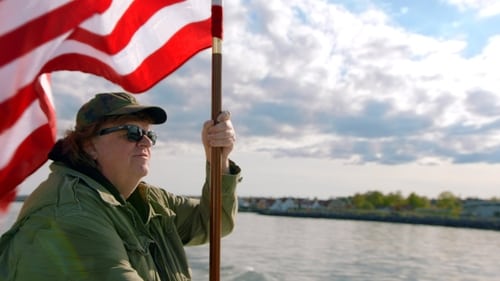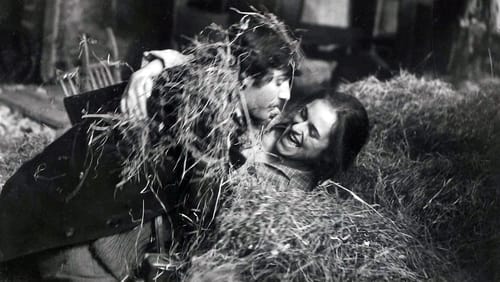Newsreel 63 – The Train of Shadows (2017)
장르 : 다큐멘터리
상영시간 : 38분
연출 : Nika Autor
시놉시스
How to relate the first Lumière film about a train to dangerous scenes shot on a smartphone by contemporary refugees hidden between iron wheels? The maker is part of an activist movement striving to revive the independent, critical newsreel efforts of the 1960s and 1970s.

미국의 골칫거리로 전락한 국방부의 SOS를 받은 마이클 무어는 펜타곤의 전사가 되어 총성도 석유 약탈도 없이, 다른 나라들의 장점만을 빼앗기로 선언하고 전 세계 침공을 시작한다. 1년에 8주 유급휴가와 13번 월급이 보장된 이탈리아, 프렌치 프라이 대신 미슐랭 3스타급 학교 급식이 나오는 프랑스, 숙제는 구시대적 발상이라는 교육수준 세계 1위의 핀란드, 학자금 대출을 모르는 대학생들이 사는 무상 대학 교육의 슬로베니아, 과거사를 인정하고 반성하도록 가르치는 독일까지. 9개 국을 정복해 나가던 마이클 무어는 진짜 중요한 사실을 깨닫게 되는데...

Charlie, the protagonist of the Slovenian film “Porno Film”, is so dedicated to his porn viewing that his two friends John and Frank jokes that he must have a PhD in pornography by now. Using Charlie’s extensive knowledge of all things porn, the trio sets out to make the “first real Slovenia porn film”, in Slovenian language and everything — except the women in the film are emigrated Russian hookers, and their Slovenian isn’t very good.

After being fired, a young car mechanic Đuro gets recommendation to look for another job in a remote village. His new boss is warm, old fashioned and naive - completely opposite from the world he's coming from. The peaceful atmosphere is shaken when Đuro falls for a regular customer's wife.

Laibach is a Slovenian avant-garde music group associated with industrial, martial, and neo-classical musical styles. They formed on June 1, 1980 in Trbovlje, Slovenia (then Yugoslavia). Laibach represents the music wing of the Neue Slowenische Kunst (NSK) art collective, of which it was a founding member in 1984. The name "Laibach" is the German name for Slovenia's capital city, Ljubljana.

A melodramatic story of Lucia, who serves as a charwoman on the Podlogar family's rich farm, and makes a fuss among householder's sons, as she becomes pregnant with one of them. A decision on whether one should be forced into marriage with the pregnant charwoman and her child, ends tragically. Will Lucia be able to sustain psychological pressure, contempt and pity of the Podlogar brothers?

1905 short film showing people walking down a Ljutomer street after mass.

Set in a Slovenian coastal town in WW2, the film tells a story about villagers who help partisans to get rid of Italian, and later German authorities that ruled the town in the last years of occupation.

An ex-partisan and current political activist sets out to Styria region in Slovenia to buy out the wheat from peasants and convince them to form the farming collective. His ostensible success (based on blackmailing rather than convincing), as well as his love defeat, make him disturbed and he kills an innocent man while performing a social mission.

In Ljubljana lives a bus driver Stebe. He's a widower. He lives with five sons and a maid Rozi. The boys are very naughty and keep annoying Rozi and, in fact all neighbourhood. One day Rozi in desperation declares that she is leaving them, because she cant stand it no more. And she does leave, although she is fond of the boys. Soon afterwards Rozi's niece Meri comes by, asking if she might stay because she wants to find herself a job in town. Meri is good girl but cannot cope with the kitchen work as successfully as her aunt. But the whole Steb family seems to be charmed by her. Even one of Stebe's own colleagues, Tone, begins to take interest in the girl. Meri likes him too. Stebe's boys feel quite disappointed because of it. But all's well that ends well: in full conspiracy Meri qualifies as bus driver while Rozi returns to the Stebe family.

2009, Slovenia. For 30 years, Alija, the miner, has been one of the many Bosnian immigrant workers. Due to the crisis, miners are losing jobs. Alija is sent to check an abandoned mine. His task is to quickly make sure the mine is empty before management sells the company. But in the mine, Alija finds hidden proof of executions after WWII. He is told to stop digging and report the mine empty. He decides to continue, although he is risking his job. Alija discovers thousands of executed people. He informs the police. He found women among the dead. Some of them were civilians, missing persons, just like his sister that was lost in the 1995 genocide in Bosnia. Alija is convinced the victims need to be brought out, identified and buried. But there is no interest in doing that. The mine is proclaimed a WWII military grave and walled in. The dead will stay unburied. Alija loses his job and struggles to preserve his dignity.

A short film from Slovenia made by Karol Grossmann.

A story about a couple from the bottom of the social ladder, about smuggling refugees across borders and other 'suspect' things- it is, first and foremost, an attempt to tell a story about the worst in people, wherever they may be coming from.

Story of a small group of people who think there is going to be an attack by a group of rabid animals. They perceive this danger through a trance they invoke by hitting their heads against a stone. They decide to oppose their enemy, and a fierce clash takes place.

Tatjana in Motherland is a partly animated documentary essay about Slovenia and its men. It is a “documentary-tale” of how Slovenian society has been disintegrating in an invisible way. The story will unveil a Slovenian Oedipus archetype of the possessive martyr mother type and her relationship with her son, in which she through emotional manipulation, by constantly creating feelings of guilt, burdens her son to such a degree, that he remains dependent on her for the rest of his life. In order to put this relationship to its best use, all Slovenian governing structures have elevated mother figure on the level of a saint and have assigned to it the cultish role. The result of the Slovenian maternal cult is a typical Slovene male, who is pathologically obsessed with his mother.

A TV journalist making a documentary in a factory finds out that the workers have been on strike and tries to analyze the strike in his film, but is thwarted by the TV company. His failure at his job is interwoven with his failed marriage.

A story set in a Slovenian village during Italian occupation. Stefuc, a man who has been widowed twice and has four daughters, wants to get married for the third time with Zana, who's already engaged and pregnant with Ludvik. Stefuc tries to separate them away, but realizes that he'll have to marry Hedvika, a nice looking girl who has just returned from Milan. In the meantime, Italian fascist authorities decide to eradicate five Slovenian songs with the help of local traitors.

Tasmania, 1954: Slovenian migrant Melita abandons her husband and young daughter, Sonja. Sonja's distraught father perseveres with his new life in a new country, but he is soon crushed into an alcoholic despair, and Sonja herself abandons him at the earliest opportunity. Now, nearly 20 years later, a single and pregnant Sonja returns to Tasmania's highlands and to her father in an attempt to put the pieces of her life back together.

In an alpine valley lies an idyllic village. High up in the mountains, facing each others across live two men: a "good grandpa" and an "evil man".

WWII - Slovenia under Italian fascist occupation. Two friends separated by a woman they both loved, and then by war as well: one of them joins partisans, the other Italian occupying forces.

Two boys, Kekec and Rozle, come to serve a farmer, with a blind daughter Mojca, as shepherds. As the night falls, the two boys start talking about a woman who lives in the mountains and is supposed to steal children. Her name is Pehta. In the morning, Kekec, Rozle and Mojca go to an Alpine cottage and Kekec promises Mojca that he will find her a remedy for her eyes. As the girl is picking flowers, Pehta arrives and takes Mojca into her cottage. She wants to keep Mojca because of her singing.












